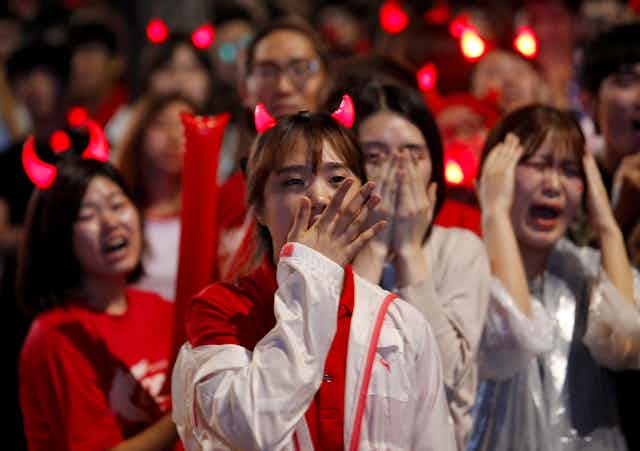Several studies appear to show quite noticeable associations between hosting and performance at World Cups and suicide rates.
When France hosted (and won) the football World Cup in 1998, the suicide rate dropped by more than 10%, particularly among men aged between 30-44. On the day following each France game, the rate dropped even further.
Likewise, when New Zealand hosted and won the rugby World Cup in 2012, there were reports that the suicide rate there dropped to almost zero.
On the face of it, these are fascinating findings. How can sport have such a large effect on the population?
Needs and relatedness
The theoretical explanation is quite simple. Self-determination theory (and several others, such as Maslow’s hierarchy of needs, below) suggests that feeling socially connected is a core human need.
Once we have fulfilled our daily requirements for food, water and safety (and nowadays, Wi-Fi!), relatedness is the next “need” to be fulfilled; a psychological need.
In a recent article in the Sydney Morning Herald I explained how sporting events such as World Cups and Olympics give us something the talk about “at the water cooler”, as well as offering a connection to a wider group – a sense of belonging.
In this way, as well as making money and providing entertainment, sport offers us a chance to build relationships (affiliation) and feel part of a larger group (belonging).
It is a very sensible “instinct” to have hard-wired into us, as we rely on relationships and our group memberships for safety and resources. Along with the core psychological need to feel competent/proficient and in control (“self-determined”), it helps to explain our relative dominance over other species and the environment.
But there may be a catch to these apparent benefits of sporting events in supporting relatedness. Sporting rivalries can sometimes drive a wedge between good friends, and cause conflict between groups of fans.
Further still, to someone who might be really struggling with depression, a shock defeat for their beloved team could be disproportionately upsetting.

In fact, if all other sources of happiness and self-esteem have run dry – a condition named anhedonia is a common aspect of depression – then someone might be very vulnerable to a seemingly small disappointment.
Humanising the statistics
Now we get to the second aspect of the title – we cannot treat this as a numbers game; a simple curiosity to fill a coffee break.
Depression can be particularly difficult to address in the macho and performance-focused culture of sport (athletes and fans alike).
In the absence of a noticeable plaster cast or brace, the illness can go completely unnoticed – especially as the sufferers usually feel it’s best to hide the issue. Two problems follow:
- there is an isolation that comes from being unable to talk about the depression; and
- by avoiding detection the illness is able to progress much further and do much more damage before any treatment is sought.
Stories of depression and suicide in sport
In 2009, German goalkeeper Robert Enke ended his life after a long battle with depression. The tragedy sparked this excellent piece in the Daily Mail, detailing the variety of athletes who have struggled with depression:
- swimmer Ian Thorpe
- rugby player John Kirwan
- AFL players Simon Hogan (in the video below) and Mitch Clark
- cricketers Marcus Trescothick, Michael Yardy and Jonathan Trott.
The case is clear that sport is a double-edged sword.
On the one hand, sport is able to unite nations and groups of fans and forming social bonds that can prevent or reduce depression.
But on the other hand, sport can be a real breeding ground for depression. The frequent, relentless evaluation, the seemingly high stakes, the emphasis on tiny details (“inches”) in determining success and failure, and a strong-but-implicit macho culture that frowns upon admitting weakness and vulnerability can all cause or amplify depression.
So let’s not morbidly wait and see if the suicide rate in Brazil (or any other nation) fluctuates during the World Cup this year, or the Olympics in 2016.
Instead, let’s connect with the disconnected and at-risk, work on reducing suicide all year round and help to create a world where those suffering don’t feel they need to hide it.
If you have depression or feel very low, please seek support immediately. For support in a crisis, contact Lifeline on 13 11 14. For information about depression and suicide prevention, visit beyondblue, Sane or The Samaritans.

